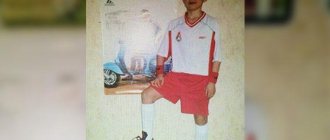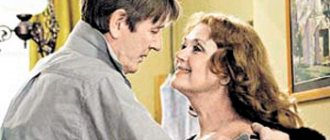An actor of amazing comic talent is Spartak Vasilievich Mishulin. He lived a difficult life, full of challenges and creativity. His roles are included in the golden fund of Russian theater and film art. Mishulin is a whole era, and today his biography continues to interest fans of his talent. Let's talk about the life and creative path of this amazing actor and unusual person.
Origin
On October 22, 1926, Spartak Vasilievich Mishulin was born in Moscow. His origin was shrouded in mystery, which the actor himself gladly accompanied with myths and fiction. No one will ever know the true story. But there are several versions of his coming into the world. The mother's story is completely logical. Anna Vasilyevna Mishulina, Deputy People's Commissar for Industry, was a high-ranking and prosperous Soviet official. She gave birth to a son out of wedlock, giving him her last name and patronymic after his grandfather’s name. She never spoke about the child's real father.
Later, Spartak came up with several origin stories for himself. Most often, he said that his father was the prominent Soviet writer Alexander Fadeev, author of the famous novel “Destruction.” The boy's mother had a long affair with the writer, and therefore the suspicions seemed well founded. Moreover, from early childhood he became interested in writing and wrote poems and stories for himself all his life.
The other version was more fantastic. Spartacus thought for some time that he was among the children brought from Spain during the revolution, his external resemblance to this people allegedly told him about this. Mishulin Spartak Vasilyevich, whose nationality was never in doubt (everyone considered him Russian), stubbornly tried to find hot southern blood in himself. This is where the third version of his birth emerged. Mishulin said that his father was a traveling gypsy. This thought was prompted by his own temperament and fiery appearance. But all his fantasies did not find any documentary confirmation. But on his mother’s side, he came from a very prosperous, educated family.
Spartak Mishulin was born on October 22 1926
years in Moscow in a wealthy family. His mother worked as Deputy People's Commissar of the gold industry and was part of the party and economic nomenklatura. As for our hero’s own father, he never saw him, since his mother became pregnant in a civil marriage. According to Spartak Mishulin, there is evidence that his father could be Alexander Fadeev. Therefore, the boy was raised by his uncle, the rector of the Academy of Social Sciences under the Central Committee of the All-Union Communist Party of Bolsheviks. By the way, it was he who came up with the boy’s name – Spartak. My uncle wrote works on the history of Ancient Rome (he also wrote a history textbook for middle grades) and among the gladiators he loved Spartacus and Aristonicus the most.”
“In the late 30s, Mishulin’s mother was arrested as an “enemy of the people,” and he was left in the care of his stepfather, his uncle and his wife. The stepfather was a drinker, so in raising a child (and a stranger at that) he used only one method - fists. In the end, Spartak got tired of this, and he left Moscow: he saw an advertisement on the street about enrollment in the 1st art school and went to the indicated address (he was misled by the prefix “art” - he thought it was a school of artists). In fact, it was an artillery school in Andzhero-Sudzhinsk (near Kemerovo). stood in the yard 1942
year.
It was at the artillery school that the itch for creativity first awakened in the young man: Mishulin became the leader of amateur performances and staged a play with the help of his students. However, there were no light bulbs in the local club, and in order not to disrupt the premiere, Spartak went to a club in a neighboring village and secretly unscrewed all the light bulbs in it. But there were witnesses to this crime. They pawned the young director, and immediately after the premiere he was arrested as a plunderer of socialist property. Already along the way, investigators exposed other “crimes” committed by Spartak Mishulin: the theft of the book “History of the Civil War” from the library and damage to the poster depicting Comrade Stalin (the future actor wrote the adventure novel “The Golden Coffin” on the back of the poster). For all these “crimes” Spartak received several years in prison. He could have received a more severe sentence, but investigators took into account his young age, removed Article 58 (political) from the case and classified the case as hooliganism.
In prison, Mishulin was lucky - he met his uncle's former driver. He was in office and gave Spartak a good job - as a trailer driver on a tractor. The work was simple: I pulled the rope and the plow rose. It would seem that you should work quietly and wait for the end of the term. However, Mishulin was unlucky here too. One day he went to fetch water for his replacement, but on the way he decided to lie down on a furrow and rest. That's when he became exhausted. And at this time the shift worker, tired of waiting for him, started the tractor and began to work without him. Spartak woke up only at the moment when the tractor had already begun to run over him and there was no way to get out from under him. And he began to be sucked under the rear axle. The replacement saw this too late, so when he finally stopped the tractor, Mishulin no longer showed any signs of life. The doctors, who found out what trouble the young prisoner was in, didn’t even bother to really examine him and immediately sent him to the morgue. And after some time he woke up there.
However, as the proverb says: “Every cloud has a silver lining.” Having fallen into the category of cripples after this incident, Spartak Mishulin was appointed head of the fire department at the mill. But even here he could not do without an incident. He decided to help the prisoners who were starving and began secretly bringing them flour in a barrel instead of water. But one day some boss asked Spartak for a drink, but there was no water in the barrel. In short, they gave him another year and a half for theft.”
IN 1995
year, Mishulin’s dacha burned down.
“For more than two years, Mishulin restored what was destroyed. To do this, he had to spend all his savings, insurance, and involve his actor friends in this business. They played three concerts with him and earned about 50 million. In addition, for some time the actor even had to bargain in a tent near Mosfilm. Spartak Mishulin sold vodka. Moreover, so that people would not recognize him, he put on a false mustache and beard.”
The actor died on July 17 2005
years from heart failure.
He was buried at the Vagankovskoye cemetery. www.calend.ru ↑ collapse
Childhood
It so happened that the mother did not want to raise the child herself. Immediately after the birth, she decided to place her son in the care of the state. But Anna Vasilyevna’s brother, the rector of the Academy of Social Sciences under the Central Committee of the Communist Party, Professor Alexander Vasilyevich Mishulin, took the baby from the orphanage. He gave his nephew a heroic name.
Mishulin Spartak Vasilievich, whose nationality was not subject to discussion, spent his childhood mainly in his uncle’s house, in the very center of Moscow. He grew up a noisy, artistic boy with a rich imagination. When Spartak was 10 years old, his mother took him to live with her. But this did not bring happiness to the boy. Mom was not used to him and was very cold, and his stepfather did not love him at all and could even raise his hand against his stepson in a drunken state. All this led to the boy trying to spend more time outside the home and attending various clubs.
He also ran away from home several times. He has several “heroic” escapes to his credit. Once, at the very beginning of the war, he persuaded a team of friends from the yard to go to the front, stole his mother’s passport and bought train tickets for everyone. For some time the company wandered around military echelons and was eventually returned to Moscow.
Spartak Mishulin: fantasies and bitter scandals of the “best Carlson of the USSR”
In the life of the good-natured, cheerful Carlson, in whose image the artist Spartak Mishulin was remembered by Soviet children, there was a lot of bitterness: he grew up without a father, lived for some time in an orphanage, repeatedly ran away from his mother... On October 22, the birthday of our favorite actor, we remember the main events of his life.
The character of Carlson - a dreamer and inventor - is actually close to Spartak Mishulin. As an adult, the artist told so many fables about his childhood and youth that he soon confused everyone, and it became unclear: was he really in prison, who was his real father, why did the artist give different dates of his birth?
Spaniard or son of the writer?
In the role of Pan Director, “Zucchini “13 Chairs”
Mom, Anna Vasilievna Mishulina, gave birth to Spartak in 1926 in a civil marriage and did not tell him about her father. The unknown gave the boy room for imagination. Then he came up with the idea that his father was the writer Alexander Fadeev , who was his mother’s classmate at the Moscow Mining Academy. Then Spartak told his friends that in fact he was a Spanish child, many of whom ended up in the USSR during the war in Spain.
Another version said that Spartak’s father was a gypsy baron, who was traveling nearby with a camp and enticed his mother. At the same time, the artist reminded those who doubted that he performs gypsy dances perfectly, even receiving first places for them at amateur competitions.
The boy’s fantasy extended even further: his friends, with their mouths open, listened to his stories about how he was grown in a test tube...
From an orphanage to a professor's family
But the fact that the mother immediately after birth sent the child to an orphanage has been proven. The woman believed that she had worked enough for the state and had the right to “throw” her child at it.
Some time later, the boy ended up in the family of his uncle - his mother’s brother, history professor Alexander Vasilyevich Mishulin. Among his main interests was the history of the ancient world. The uncle gave the boy an unusual name - in honor of his favorite hero. However, Spartak was lucky: the professor named his own son Aristonicus.
Unruly Teen
Still from the film “Chanita’s Kiss,” 1974.
Until the age of 10, the boy lived with his uncle. Then his uncle insisted that Spartak move in with his mother: apparently, the venerable professor hoped to awaken his sister’s conscience. However, both the mother and her new husband accepted the child reluctantly and treated him frankly poorly: the stepfather often drank and beat Spartak, the mother hardly noticed him, living her life...
Not intending to tolerate such an attitude, the freedom-loving boy kept running away from the cold house where no one loved him. He spent time in companies, often becoming a participant in “adventures”, for which he ended up in the police.
Striving to the front
Still from the film “Songs Above the Clouds,” 1976.
When the war began, Spartak’s family was evacuated from the capital. They ended up in distant Dzerzhinsk. But the 13-year-old teenager was not going to sit in the rear. Together with their friends, they decided to escape to the front. But how? Train tickets were sold only with passports. Resourceful Spartak stole his mother’s passport and entered five of his friends in the “Children” column. “Brothers and Sisters” purchased tickets for everyone, anticipating military exploits. But they never made it to the front - everything was limited to traveling in a military train, which took them only to the Moscow region.
Spartak, however, did not give up. A year later, he again fled to Moscow in order to get to the front from there. In the capital, he met a boy who told him a pitiful story: he was enrolled in an art school, but he could not go because his single mother would remain here. Spartak decided to help out his new friend and at the same time get closer to his dream of becoming an artist: he went to art school instead of the boy, deciding that “art” means artistic. In fact, the school was an artillery school...
How the future “Carlson” ended up in prison
A still from the film “What is Yeralash?”, 1986.
The artist also spoke about this episode in different ways. According to one version, he was “swept up” for using portraits of Joseph Stalin , on the back of which Spartak, for lack of other paper, wrote his literary works. According to another, Spartak “borrowed” light bulbs from the House of Culture to improve the lighting on the stage where he held a concert. According to the third, he was not given a book in the library, and he snuck in to get it at night, breaking a window...
Love for art
From early childhood, Mishulin Spartak Vasilyevich, whose biography was not easy, dreamed of becoming an actor and participated in amateur performances. At the beginning of the war, during his next escape from home, he met a crying boy on the street, his own age. He said that he was enrolled in an art school, but he didn’t want to go because his mother would be left alone. Spartak decided that the prefix “art” meant art and invited the guy to take his place. So, to his surprise, he ended up in Anzhero-Sudzhensk at the artillery school. But Spartak remained true to himself here too, he led local amateur performances and began preparing a big concert for the local population in the House of Culture.
Since the club was abandoned, there were not even light bulbs in it. And in order for the concert to take place, Mishulin decided to borrow lamps from a neighboring club. He was caught in this theft, received a severe reprimand and was taken into account. The next time he suffered again in the “field of art.” He began writing a novel, and to obtain reliable facts, he stole a book from the library. The investigation began, and then it turned out that Spartak wrote his works on the back of Lenin’s portraits. This was regarded as treason to the Motherland, and here Mishulin was already given a real sentence.
↑ Artist? No, artilleryman!
When the Great Patriotic War began, the Mishulin family was forced to live in evacuation. Their refuge at this time was the city of Dzerzhinsk not far from Gorky (Nizhny Novgorod). Spartak, who grew up as a restless child, continued his tricks there.
One day he and his friends wanted to go to the front. However, they were allowed out of the city only with passports. Spartak was immediately found - he stole the passport from his mother (who had by then been released) and wrote down his five friends in it as her sons.
Said's role in the film White Sun of the Desert photo
Using his passport, they sold him tickets to Moscow, through which he could get to the scene of events. Spartak returned his passport and rushed to the capital with his friends. The guys got there successfully, but they weren’t taken to the front. I had to go back.
At this time, Spartak Mishulin seriously thought about becoming an artist. He found out that in Anzhero-Sudzhensk (more precisely, in the villages of Anzher and Sudzhenka that then existed in its place) there was a special art school, and he entered it - he thought that it was artistic; but it turned out to be an artillery school. So Spartak first learned to shoot, and only then tried to realize his acting plans.
Zucchini 13 chairs. S. Mishulin as director photo
He was actively involved in amateur performances, for which he once suffered. During the organization of one performance at the Angers club, it was necessary to obtain several electric light bulbs. Times were hard, and Spartak decided to unwind them for a while in the nearby Sudzhensk club, which was a little better equipped. The performance took place, but someone denounced Spartak as a “thief.”
Years of imprisonment
Investigators took into account Mishulin’s youth and removed the terrible Article 58 from the case. He was sentenced to only one and a half years in prison for hooliganism. In prison, he worked as an assistant to a tractor driver. One day he fell asleep in the field from fatigue, and a tractor ran over him. At the hospital, doctors fought for his life for a long time and barely saved him. His health was weak, so he was allowed to do what was already familiar to him - leading the prison’s amateur performances. He created an orchestra of folk instruments, a choir, and prepared concerts. Then he finally realized that he did not want to be anything other than an artist.
The beginning of a creative journey
After his release, Mishulin Spartak Vasilyevich began to think about how he could fulfill his dream. At the invitation of a friend, he comes to the small village of Brusov, where he becomes the leader of an amateur art group. The success of his troupe was quickly noticed and Spartak was invited to the larger village of Udomlya. Then he decided to try his hand and entered a competition at the theater in Kalinin. But then he was finally found by his uncle, who had lost sight of his nephew during the war.
Spartak comes to Moscow, dreaming of getting a theater education. His uncle arranged an audition for him at GITIS, but they could not accept him there due to the lack of secondary education. His uncle tried to get him into school. B. Shchukin, but the rector strongly disliked those who were sent “from above” and refused Mishulin. Then the uncle helped his nephew enter the troupe of the Kalinin Theater. He worked there for 5 years.
During this time, his comic talent and acting talent were fully revealed. Over the years, he played more than 40 major roles. He worked for several years at the Omsk Theater, where he showed the depth of his dramatic talent. Here Spartak began writing songs, some of which were performed in plays, and he also had the opportunity to work with director V. Motyl. Then he returned to Kalinin again. Mishulin was happy with his fate: he was doing what he loved, he had many different roles, but he had not yet reached his limit.
Theater of Satire
In 1960, Spartak Vasilyevich came to Moscow on tour of the Kalinin Theater. His performance was so impressive that he received three invitations to the capital's theaters. The actor chose the Satire Theater and served there for the next 45 years. His entry into the new troupe was quite easy, but his creative path was not simple. At first, he had little success at introductions to touring performances, but his first leading role turned out to be a failure, but the fault was not the actor’s performance, but the quality of the play.
But gradually he develops his own repertoire. He plays in “12 Chairs” and “The Golden Calf”, in “The Tricks of Scapin”. And in 1968 he received the main role in the play “The Kid and Carlson.” He played the man with the propeller for the next 30 years. Very quickly Mishulin Spartak Vasilyevich, whose photo still hangs in the theater foyer, became one of the stars of the Satire Theater. His performances were always sold out. But, surprisingly, over such a long theatrical history he had only 16 roles in the Theater of Satire. Everything changed later, in the 90s. He played several roles in the New Drama Theater and worked in an enterprise.
Biography of Spartak Mishulin
In 1942, Mishulin studied at an artillery school in the city of Andzhero-Sudzhinsk, Kemerovo region, where he directed amateur performances.
Following a denunciation, he was convicted of damaging a poster depicting Stalin and spent several years in prison.
After the release of Spartak, Mishulin worked as the artistic director of the propaganda team in the cultural centers of the villages of Brusovo and Udomlya, Tver Region.
In the early 1950s he joined the auxiliary staff of the Kalinin Drama Theater. After working there for several years, he moved to the troupe of the Omsk Drama Theater, then returned to Kalinin.
He played in the plays “Wedding with a Dowry” by Nikolai Dyakonov (Kurochkin), “The Irkutsk Story” by Alexey Arbuzov (Sergey), “On the Other Side” by Anatoly Baryanov (Denisov), “Three Sisters” by Anton Chekhov (Tusenbach), etc.
In 1960, after a tour of the Kalinin Theater in Moscow, Spartak Mishulin was invited to three capital theaters at once - Lenkom, TsATSA and Satire. He chose the Moscow Academic Theater of Satire, where he worked until his last days.
He played the roles of Ostap Bender in “The Twelve Chairs” based on Ilya Ilf and Yevgeny Petrov, Scapin in “Scapin’s Plots” by Jean Baptiste Moliere, Peacham in “The Threepenny Opera” by Bertolt Brecht. Among his works are Kalabushkin in “The Suicide” by Nikolai Erdman, Kramnagel in the play of the same name by Peter Ustinov, Khlynov in “A Warm Heart” by Alexander Ostrovsky, Boraenko in “Schastlivtsev-Neschastlivtsev” by Grigory Gorin, Geniaro in the play “Naples - the City of Millionaires” by Eduardo de Filippo.
For 35 years, Spartak Mishulin played Carlson in the theater’s children’s play “The Kid and Carlson, Who Lives on the Roof,” based on Astrid Lindgren.
At the Moscow New Drama Theater, Mishulin performed the main roles in the plays “The Kid and Carlson” (1996) and “Jourdain” (1998) based on the play by Moliere.
In 1999, especially for Spartak Mishulin, the director of the Modern Theater Svetlana Vragova staged “Happy Event” based on the play by Slavomir Mrozhek.
The artist’s popularity was brought to him by the television entertainment program “Zucchini “13 Chairs” (1968-1981), in which the actor played the role of Mr. Director.
One of his most famous film roles is that of Sayid in White Sun of the Desert (1968). In 1971, he played Ilya Tarakanov in the adventure detective story “Property of the Republic” by Vladimir Bychkov. Spartak Mishulin starred in the films “No Smoke Without Fire” (1972), “Talisman” (1983), “Pericola” (1984), “We sit well!” (1986), “The Man from Boulevard des Capucines” (1987), “Private Detective, or Operation Cooperation” (1989), “The Enchanted Wanderer” (1990), “The Good Fellows” (1993), “The Master and Margarita” (1994) ), “Poor Sasha” (1997), “The Town Musicians of Bremen and Co” (2000), the series “Money Can’t Buy Happiness” (2005), etc.
His last film role was the character of Grandfather Shchukar in the film “On the Maiden River” directed by Vasily Panin.
The actor continued to play on the stage of the Satire Theater until recently - he was involved in the anniversary play “We Still Funny” (2004).
On July 17, 2005, Spartak Mishulin died in Moscow. He was buried at the Vagankovskoye cemetery.
In 1981, Mishulin was awarded the title People's Artist of the RSFSR. He was a laureate of the State Prize of the Russian Federation in the field of literature and art in 1997, awarded the Order of Honor (1996) and the Order of Friendship (2002). The actor was awarded the I. Smoktunovsky Prize and the Lumiere Brothers Prize.
Spartak Mishulin was married. His daughter Karina became an actress and works at the Satire Theater.
The material was prepared based on information from RIA Novosti and open sources
Best roles in the theater
Over the many years of work at the Satire Theater, Mishulin had several successful projects. Of course, the best Carlson of the USSR is Spartak Vasilievich Mishulin. Children adored him, and several generations of children grew up watching his performances. This is probably one of his most famous roles, especially since he performed it for so long. The actor’s successes also include the role of Peachum in “The Threepenny Opera”, the King in “An Ordinary Miracle”, Kalabushkin in “The Suicide”, Boraenko in “Happy and Unlucky”.
"Zucchini 13 chairs"
In 1966, Mishulin began a new life. He was invited, along with other actors of the Satire Theater, to star in the TV show “Zucchini 13 Chairs.” The program with humorous skits and music in the languages of the countries of the socialist camp was a real breath of fresh air on Soviet television. Therefore, the popularity of the project today is difficult to even imagine. During the screening of the next episode, the streets were empty, and the next day the whole country was discussing the episode. Spartak Vasilyevich played Pan Director and was able to fully realize his comedic gift in this role. In addition, he found his soulmate on the program.
Mishulin Spartak Vasilyevich, whose wife worked as an assistant director, was able to achieve everything he dreamed of in this project: fame, creative fulfillment and personal happiness.
Movies
The debut on the television screen of Spartak Mishulin immediately brought him all-Union fame. In the television series “Zucchini “13 Chairs” he played Pan Director and, along with Olga Aroseva and Valentina Sharykina, became a people's favorite, appearing in this role for 14 years.
Spartak Mishulin in the television series “Zucchini “13 Chairs”
Even more famous is the 1969 film “White Sun of the Desert,” where Spartak played the courageous Central Asian resident Said, who is looking for his blood enemy and helps the Red Army soldier Sukhov in the fight against the local residents. After this comedy Eastern, Spartak Mishulin and Anatoly Kuznetsov became one of the most popular actors. The film itself was called a cult film, and many phrases uttered by the actors turned into aphorisms.
Spartak Mishulin in the film “White Sun of the Desert”
Subsequently, the actor had very diverse roles. He again played Carlson in a television production based on the fairy tale “The Kid and Carlson Who Lives on the Roof,” managing to gain authority not only among adults, but also among children.
Spartak Mishulin in the film “The Kid and Carlson, Who Lives on the Roof”
In the western comedy “The Man from Boulevard des Capuchins” he appeared before the audience in the image of an Indian leader, and in the film adaptation of Mikhail Bulgakov’s legendary novel “The Master and Margarita” he demonstrated his vision of such a character as the restaurant director Archibald Archibaldovich. The last time Mishulin acted in a movie was before his death. It was the fantasy saga "Aziris Nuna", in which he appeared as a watchman.
Film work
In 1969, Mishulin Spartak Vasilyevich played in films for the first time; he was invited to play the role of Said in the film “White Sun of the Desert” by V. Motyl. By that time, the actor already had all-Russian popularity. V. Pluchek, artistic director of the Satire Theater, categorically forbade his actors to act in films, and Mishulin had to carefully hide his participation in the work of V. Motyl. The film did not reach the viewer easily, the censor did not want to agree with many fragments, but after its release the film was snapped up for quotes and only became more popular every year. Spartak Vasilyevich's successes in cinema were more modest than in the theater. He was mostly offered supporting roles; no one saw him as a hero. But even in small roles he created vivid and memorable images.
Filmography of the artist
The filmography of Spartak Mishulin includes several dozen films. Among the latest films in which the famous actor managed to star, it is worth noting the following:
Spartak Mishulin as Carlson
- 2006 The film “Aziris Nun” (released after the artist’s death). Spartak Mishulin played the role of a watchman.
- 2005 year. Film "Money Can't Buy Happiness"
- 2004 Film "Night Salesman". Spartak Mishulin played the role of the buyer.
- 2003 Film "Thank You". Spartak Mishulin played the role of the donor.
- 2003 Film "Baby Goat in Milk". Spartak Mishulin played the role of Kostozhogov.
A special place in the artist’s biography is occupied by his work in the theater. Spartak Vasilievich played in approximately 20 performances. It is also worth remembering the artist’s participation in television performances. There are about 8 of them. In addition to working in the theater and filming films, Spartak Mishulin was involved in voice acting for children's cartoons. He voiced his last cartoon in 2004 - “Dunno and Barabas”.
Still from the film “White Sun of the Desert”
Spartak Vasilievich also had experience working on radio. For some time he broadcast on the Radio-1 station (Moscow). His program was dedicated to circus art.
Personal life
Mishulin Spartak Vasilyevich, whose personal life is still of interest to viewers, has always been liked by women. But he, despite a considerable number of novels, enters into marriage for the first time already in adulthood. He met his wife Valentina on television and they dated for six years before getting married. At 54, Mishulin became a father. To say that he loved his wife and daughter means to say nothing. He did absolutely everything for them. His wife said that she and Spartak lived better than Christ in his bosom. He spent every free minute with his daughter Karina; later the girl also became an actress.
last years of life
In the 90s, a difficult period began in the actor’s life. His relationship with Pluchek deteriorated, there were no new roles in the theater, there was a crisis in cinema, and life became difficult. Mishulin Spartak Vasilyevich, whose daughter and wife were the main objects of concern, was ready to do anything to earn money for the well-being of his girls. At one time he even sold beer in a kiosk near Mosfilm in order to repair a burned-out dacha. By the early 2000s, life began to get better again. Opportunities arose to work in other theaters, there were many enterprise performances, and cinema gradually returned. In five years he starred in 9 films.
Death and memory
Throughout his life, the actor did not experience any major health problems. But he easily believed the doctors who said that he needed to have a heart bypass; they gave an almost 100% good prognosis for the operation. But it so happened that after the intervention he lived only 3 days. He died on July 17, 2005. Mishulin Spartak Vasilyevich, whose grave is located at the Vagankovskoye cemetery, remains in the memory of grateful viewers today. Even the younger generation remembers his Said and repeats his phrases.
Date and causes of death
Figure 1. Spartak Mishulin played the role of Carlson more than 2000 times
On July 17, 2005, the famous Russian actor Spartak Mishulin died. The day before, at the insistence of doctors, Mishulin underwent a simple heart operation - coronary artery bypass grafting. After medical intervention, the actor lived only three days, two months short of his 79th birthday.
The actor often complained of acute pain in his heart and they often called an ambulance straight to the theater. Colleagues insisted on hospitalization. The director of the Satire Theater Mamed Agayev persuaded Mishulin to undergo examination at the Cardiac Surgery Center. Doctors convinced the actor that a simple surgical intervention would benefit him. The artist planned to return to work again in the near future, but his heart could not stand it and stopped forever.










